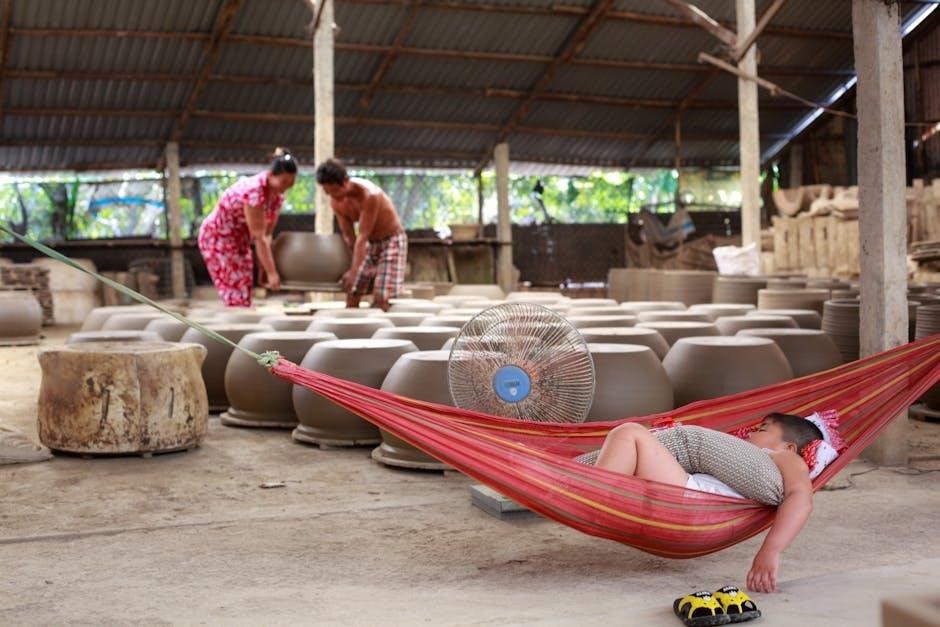Reconnecting with time-honored techniques fosters self-sufficiency, sustainability, and a deeper bond with nature, empowering individuals to thrive in modern life while preserving timeless wisdom.
Why Traditional Skills Matter in the Modern World
Traditional skills offer timeless practicality, fostering resilience and sustainability in today’s fast-paced world. They empower individuals to reconnect with nature, reduce reliance on industrial systems, and cultivate self-sufficiency. By mastering techniques like organic gardening, food preservation, and natural health remedies, people gain independence and confidence. These skills also promote environmental stewardship, encouraging a simpler, more mindful lifestyle. In an era of technological overdependence, traditional skills provide a foundation for problem-solving and adaptability, ensuring that essential knowledge is preserved for future generations. Embracing these practices not only enriches personal lives but also strengthens communities, creating a legacy of wisdom and sustainability.
Benefits of Learning Time-Honored Techniques
Learning traditional skills offers numerous benefits, including enhanced creativity, practical problem-solving abilities, and a sense of accomplishment. These techniques promote self-reliance, allowing individuals to save money and reduce their environmental footprint. By engaging in activities like woodworking or organic gardening, people develop patience and a deeper connection to their surroundings. Additionally, traditional skills often involve working with natural materials, fostering an appreciation for craftsmanship and sustainability. They also provide a meaningful way to connect with heritage and culture, ensuring the preservation of valuable knowledge for future generations. Embracing time-honored techniques enriches both personal and communal life, promoting resilience and a more fulfilling lifestyle.
Gardening and Food Preservation
Gardening and food preservation are essential traditional skills, offering sustainable ways to grow and store food, ensuring nutritious meals year-round while promoting self-sufficiency and environmental harmony.
Organic Gardening: Tips for Growing Your Own Food
Organic gardening is a rewarding practice that connects you with nature while providing fresh, healthy produce. Start by selecting a sunny spot and preparing soil with compost or manure to enhance fertility. Choose heirloom seeds for better flavor and biodiversity. Water wisely, using rainwater or drip irrigation to conserve resources. Companion planting, like pairing tomatoes with basil, can deter pests naturally. Avoid chemical pesticides by introducing beneficial insects or using neem oil. Regularly mulch to retain moisture and suppress weeds. Seasonally rotate crops to maintain soil health and prevent disease buildup. With patience and dedication, you’ll enjoy a bountiful harvest while promoting sustainability and self-sufficiency.
Food Preservation Methods: Canning, Smoking, and Dehydrating
Mastering food preservation techniques like canning, smoking, and dehydrating ensures year-round access to fresh flavors and nutrients. Canning involves sealing food in airtight jars, creating a vacuum to prevent spoilage, ideal for fruits, vegetables, and meats. Smoking uses low heat over time to infuse flavor and dry out food, preserving it naturally. Dehydrating removes moisture through heat or sun exposure, perfect for making jerky, dried fruits, and herbs. Each method requires attention to safety guidelines to avoid contamination. With these skills, you can enjoy seasonal harvests and homemade meals throughout the year, reducing reliance on processed foods and embracing sustainable living.
Self-Reliance and Shelter
Mastering self-reliance and shelter-building skills empowers individuals to thrive independently, using natural materials and sustainable practices to create safe, durable living spaces, fostering resilience and freedom.
Building Shelter: From Log Cabins to DIY Sheds
Building shelter is a cornerstone of self-reliance, offering protection from the elements while connecting us to natural surroundings. Traditional techniques like log cabin construction emphasize durability and harmony with the environment, using locally sourced materials such as timber and stone. DIY sheds provide practical storage solutions, teaching essential carpentry skills. These structures not only serve functional purposes but also embody a sense of accomplishment and sustainability. Whether crafting a cozy cabin or a simple shed, these projects promote self-sufficiency and a deeper appreciation for craftsmanship. By mastering these skills, individuals can create lasting, functional spaces that stand the test of time.
Water Sourcing and Purification Techniques

Mastering water sourcing and purification is essential for self-reliance, ensuring access to clean drinking water in any situation. Traditional methods include identifying natural springs, digging wells, and collecting rainwater. Purification techniques such as sand filtration, boiling, and solar disinfection remove contaminants, making water safe for consumption. These skills are vital for off-grid living and emergency preparedness, promoting sustainability and health. By learning these timeless practices, individuals can secure a reliable water supply, reducing dependence on modern infrastructure while reconnecting with nature’s resources. Water sourcing and purification are foundational skills that empower individuals to thrive in diverse environments, ensuring resilience and well-being.

Natural Health and Wellness
Embrace traditional health practices to foster holistic well-being, empowering individuals to naturally heal and maintain vitality through sustainable, time-tested methods that promote body, mind, and spirit harmony.
Herbal Remedies: Using Nature for Healing
Herbal remedies offer a natural approach to health, leveraging the healing properties of plants. From calendula for skin ailments to chamomile for relaxation, these traditional methods provide effective, holistic care. Many herbs can be grown at home or sourced sustainably, making them a cost-effective and eco-friendly alternative to synthetic drugs. Learning to prepare herbal infusions, salves, and tinctures allows individuals to take charge of their well-being. With proper knowledge, herbal remedies can address common issues like colds, digestive problems, and minor injuries. Start by exploring easy-to-grow herbs and simple preparation techniques. Always consult credible sources or professionals to ensure safe and effective use, especially for chronic conditions or interactions with medications. Embrace nature’s pharmacy for a healthier, more self-sufficient lifestyle.
Natural Cleaning Products: DIY Solutions
Natural cleaning products offer eco-friendly and cost-effective alternatives to commercial chemicals. Using simple ingredients like vinegar, baking soda, and essential oils, you can create effective cleaners for your home. For instance, a mixture of equal parts water and white vinegar in a spray bottle works wonders for surfaces. Baking soda is a versatile scrub for sinks and toilets. Essential oils like lemon or tea tree add a fresh scent and antibacterial properties. Making your own cleaning solutions reduces exposure to harsh chemicals, benefits the environment, and saves money. Start with basic recipes for all-purpose cleaners, glass polish, and scrubbing pastes. Experiment with different combinations to find what works best for you.

Traditional Crafts
Traditional crafts connect us to heritage, fostering creativity and practical skills. Woodworking, textiles, and other time-honored practices offer meaningful expression and lasting results, enriching modern life with handmade charm.
Woodworking Basics: Creating Functional Items
Woodworking is a timeless craft that combines creativity with practicality, allowing individuals to create functional and beautiful items for everyday use. Starting with essential tools like chisels, hand saws, and sandpaper, beginners can learn to craft items such as stools, cutting boards, and storage boxes. Understanding wood types, grain patterns, and proper measuring techniques is crucial for precise results. Basic joints like dovetail and mortise-and-tenon provide durability, while sanding and finishing enhance the final product. Sustainability is key, as reclaimed or locally sourced wood reduces environmental impact. Safety and patience are paramount, making woodworking a rewarding skill that connects us to our heritage while fostering self-reliance and creativity.
Textiles: Knitting, Weaving, and Sewing
Mastering textiles like knitting, weaving, and sewing allows individuals to create handmade clothing, home goods, and accessories, fostering creativity and self-sufficiency. Knitting involves using needles to manipulate yarn into fabrics, while weaving relies on looms to interlace threads. Sewing brings these materials together to form functional items. Traditional techniques, such as hand-spinning wool or flax, emphasize sustainability. Natural dyes and hand-woven patterns add unique charm to creations. These skills not only preserve cultural heritage but also offer a meditative, fulfilling way to produce personalized textiles. By learning these crafts, one can create durable, ethical, and bespoke items, reconnecting with the artistry of handmade goods in a fast-paced world.

Outdoor Survival Skills
Mastering outdoor survival skills, such as navigating with maps and compasses, building shelters, and starting fires, equips individuals to thrive in wilderness environments with confidence and resilience.
Navigation: Reading Maps and Using a Compass
Mastering navigation skills is essential for exploring the outdoors confidently. Reading maps involves understanding symbols, scales, and contour lines to interpret terrain. A compass provides direction, helping you pinpoint locations and paths. Orienting the map, identifying magnetic north, and using landmarks are key techniques. Natural navigation, such as following the sun’s position or recognizing plant growth patterns, can also guide you. For beginners, practicing with a baseplate compass and a topographic map is crucial. Always carry extra batteries for GPS devices, but rely on traditional methods as a backup. These skills ensure safety and independence in wilderness settings, making them indispensable for any adventurer.
Fire Starting: Essential Techniques
Fire starting is a vital outdoor survival skill, providing warmth, light, and a means to cook food. To begin, gather tinder (e.g., dry leaves, grass, or paper), kindling (small twigs), and larger logs as fuel. Use a flint and steel or ferrocerium rod to create sparks, directing them onto the tinder. Once ignited, add kindling to build the flame. A bow drill is another traditional method, using friction to generate heat and sparks. Always choose a safe, sheltered location for your fire and monitor wind conditions. Keep water nearby to extinguish it fully when done. Mastering these techniques ensures reliability in wilderness settings, making fire starting an indispensable skill for any adventurer.